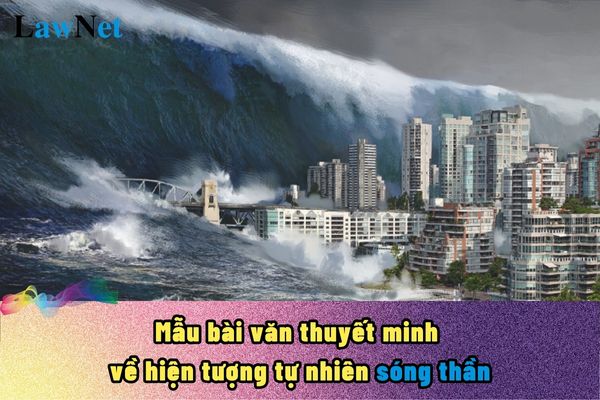Vietnam: What are the sample expositive essays on the natural phenomenon - Tsunamis? What is the time allocated for the speaking and listening content in the 6th-grade Language curriculum?
What are the sample expositive essays on the natural phenomenon - Tsunamis in Vietnam?
Students can refer to some sample expositive essays on the natural phenomenon - Tsunamis in Vietnam as follows:
|
Sample expositive essays on the natural phenomenon - Tsunamis Sample 1: Tsunamis – The Devastating Power of Nature |
*Note: The information about the sample expositive essays on the natural phenomenon - Tsunamis is for reference only./.

What are the sample expositive essays on the natural phenomenon - Tsunamis? What is the time allocated for the speaking and listening content in the 6th-grade Language curriculum? (Image from the Internet)
What is the time allocated for the speaking and listening content in the 6th-grade Language curriculum in Vietnam?
Under Section 8 of the General Education Program for the Literature issued in conjunction with Circular 32/2018/TT-BGDDT, the duration of the Language curriculum at each educational level is as follows:
[1] Duration in grades (according to the number of lessons)
| Grade 1 | Grade 2 | Grade 3 | Grade 4 | Grade 5 | 6th-grade | Grade 7 | Grade 8 | Grade 9 | Grade 10 | Grade 11 | Grade 12 |
| 420 | 350 | 245 | 245 | 245 | 140 | 140 | 140 | 140 | 105 | 105 | 105 |
In the upper secondary level, each grade has an additional 35 lessons for elective academic topics.
[2] Time allocated for educational content
The time allocated for educational content is determined by textbook authors and teachers, based on the achievement goals required at each grade level and actual teaching conditions. However, it is necessary to ensure a reasonable balance among the following components:
- Between acquiring knowledge and practicing skills (with a focus on practicing practical and applicative skills).
- Among different types and forms of text for reading, writing, speaking, and listening (more time allocated for reading literary texts).
- Among the skills of reading, writing, speaking, and listening (more time allocated for practicing reading skills); specifically, the time allocation for each skill at each grade level is as follows:
| Grade Group | Reading | Writing | Speaking and Listening | Periodic Assessment |
| From Grade 1 to Grade 3 | about 60% | about 25% | about 10% | about 5% |
| From Grade 4 to Grade 5 | about 63% | about 22% | about 10% | about 5% |
| From Grade 6 to Grade 9 | about 63% | about 22% | about 10% | about 5% |
| From Grade 10 to Grade 12 | about 60% | about 25% | about 10% | about 5% |
>>> Download the General Education Program for Literature issued in conjunction with Circular 32/2018/TT-BGDDT.
Thus, the duration of speaking and listening content in the 6th-grade Language curriculum in Vietnam only accounts for about 10%.
What are the professional ethics standards for 6th-grade Literature teachers in Vietnam?
Under Article 2a of Circular 03/2021/TT-BGDDT as supplemented by Clause 1, Article 3 of Circular 08/2023/TT-BGDDT, the professional ethics standards for 6th-grade Literature teachers are as follows:
- Adhering to the guidelines and policies of the Communist Party of Vietnam, the laws of the State, and the regulations of the sector and localities regarding junior high school education.
- Consistently nurturing ethics, upholding a sense of responsibility, maintaining the dignity, honor, and reputation of educators; setting an example for students.
- Showing care, fair treatment, and respect for students; protecting the legitimate rights and interests of students; uniting and assisting colleagues.
- Strictly implementing the regulations on the general responsibilities and obligations of public employees and the regulations of the Ministry of Education and Training on teachers' ethics.

